Bhavendu Joshi
A Post-Graduate of Environmental Science and a field ecologist, my fascination with the natural world started at a very early age. This fascination has only deepened over the years and has led me to take up conservation biology professionally. My interests are applied in nature, specifically on the spatio-temporal configuration of biodiversity and ecosystem service flows in socio-ecological systems of Nagaland, Northeast India.
I have previously worked on large mammal ecology and conservation in human-dominated landscapes of Northeast India. Currently, we are identifying and securing wildlife habitats in Nagaland through the involvement of local communities in conservation. Broadly speaking, my interest lies in understanding human–nature relationships, especially with respect to socioeconomic factors that influence landscape ecology and spatial planning. In the future, I would like to continue to work towards engaging communities in conservation while pursuing robust scientific research.

Arjun Menon
Arjun’s curiosity about the life around us led him to the world of natural history. As he started to realise the innumerable threats that wildlife face, Arjun, during his Bachelor’s at Christ University, Bangalore, became a member of Green Army––a group of youngsters with a zeal to learn more about nature. He interned and volunteered with various projects to understand wildlife distribution, human-large carnivore interactions and socio-cultural tolerance.
Arjun's work, spanning the Western Ghats, Central India and Cis-Himalayas of India, ultimately led him to Northeast India. He assisted with scientific research in Nagaland on mammal distribution and the perception of local communities towards natural resources. He also assisted in formulating a perspective plan to conserve elephants in Arunachal Pradesh. Arjun is interested in studying primate behaviour and ecology, and also wants to learn more about the relationship between local communities and nature. In his free time, he loves cooking and sketching.
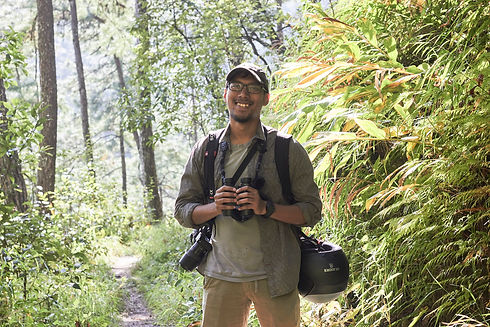
Biang La Nam Syiem
Biang’s love for wildlife started from an early age, growing up in the hill station of Shillong, India, and exploring the surrounding countryside. With an interest to eventually work in the wildlife sciences, he pursued a Bachelor’s degree in Zoology from the University of Delhi from 2011 to 2014. During this time, he was awarded an internship opportunity at the Salim Ali Centre for Ornithology and Natural History in Tamil Nadu, where he first experienced professional field-based wildlife research. He then went on to pursue a Master’s degree in Wildlife Biology and Conservation from the multi-institutional program at National Centre for Biological Sciences, Bangalore, from 2014 to 2016. His dissertation project was on forest birds in Meghalaya, which he completed under the supervision of Dr. Divya Vasudev and Dr. Varun Goswami. After his masters, he worked as a scientific consultant on various large mammal conservation projects in Assam, Nagaland and Meghalaya.
Currently, Biang is pursuing a PhD degree from Deakin University, Australia, under the supervision of Prof. Don Driscoll, Dr. Divya Vasudev and Dr. Varun Goswami.
Biang’s interest lies in the conservation of bird and mammal communities in the landscapes of Northeast India, especially on private and community-owned forests. While ecology and its various sub-disciplines are his primary focus, he is also interested in the sociological aspects of conservation and how they can determine conservation outcomes for the region.
Zorba Z. Laloo
A conservation partner of CI, Zorba worked with independent documentary film-makers for the BBC, National Geographic, and other leading Indian and European television, after his studies in Shillong and Darjeeling. He was researcher and cameraman for the Darjeeling Himalayan Railway, a documentary that received an award from the Royal Television Society, UK, in 2010. As a crew member for the Swiss-owned expedition company Ribexpeditions, he completed several source-to-sea expeditions under the tutelage of seasoned leaders.
Inspired by rivers, he started paddling in Meghalaya and Northeast India with friends for sport and exploration. They were the first in India, and among the first in Asia, to start using packrafts. In 2012, he received the 'Golden Paddle Award' from the American Packrafting Association for his contribution to promoting paddle sports and river conservation. Disappointed by the lack of opportunities for students to experience the outdoors in Meghalaya, Zorba co-founded Campfire Trails, which has, to date, catered to almost 2000 students. Campfire Trails also works closely with villages to help design and develop sustainable eco-rural tourism projects, for which, it received the NEDFi Award for social entrepreneurship in 2015.

Ezra Rynjah
Ezra was born in Shillong, a town nestled in the hills of Meghalaya, India. There, he grew up with an avid fascination of the natural world and people's relationship with it. He went on to obtain a Master’s degree in Environmental Studies and Resource Management from TERI School of Advanced Studies, New Delhi in 2015. Being inherently curious, he is keen to explore new places and different means of addressing wildlife conservation and sustainability concerns for the environment. He has worked on different projects in various parts of the country, from water quality assessments on the Andhra Pradesh-Karnataka border, Adivasi rights in northern Odisha, vegetation research in Mudumalai and Pondicherry in Tamil Nadu, forest management and nursery establishment in Himachal Pradesh, mammal surveys and wildlife conservation in Assam, Nagaland and Meghalaya, and the impacts of coal-mining in Meghalaya.
Currently, Ezra is on the trail of the clouded leopard in the forests of Meghalaya and beyond. He is also interested in tropical forestry, planning to work with the people of Northeast India to grow forests in the near future for wildlife and were-tigers.
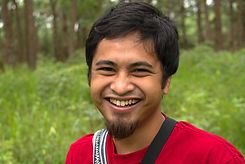
Pragyan Sharma
Pragyan’s interest for wildlife and nature is a result of his academic background, and watching nature and wildlife channels from a young age. A Bachelor’s in Zoology and a Master’s in Environmental Science, and adding to this, his interest in snakes, inspired him to work in the field of wildlife.
He is a self-taught artist and is pursuing his career in wildlife film-making, and portrait and fashion photography. His current film projects focus on showing behind-the-scenes visuals of our different on-going wildlife projects in Northeast India. This includes background research and on-field work to create films that can help provide awareness on conservation of wildlife in Northeast India. He is also involved in designing various materials for awareness programs, such as booklets, posters, brochures, and mugs; and assisting in research work.
Pragyan wants to take a different approach to making wildlife films: contemporary in style and based on the importance and application of science in conservation; and to present complex scientific research and conservation ideas to laypersons in simple forms, such that they are helpful for them as well as for wildlife.

Parvathi Prasad
I was introduced to India's glorious forests and wildlife as a young girl. What began as excitement to watch animals developed into a passion that shaped my choice of career. As part of my professional training, I obtained a Master's degree in Tropical Biology and Conservation from James Cook University, Australia. My experiences so far have taken me to two incredible landscapes — Karnataka's Western Ghats and Assam's Kaziranga; both landscapes fill me with wonder and motivate me. The forest–tea estate mosaic of the Kaziranga landscape is my current study site, where I am working towards research-based conservation of elephants as part of the Conservation Initiatives team. The project strives to create a secure landscape for elephants that is inclusive of Kaziranga National Park and the neighbouring tea gardens, while engaging with the Government and local communities to achieve the same. As part of this project, I am pursuing a PhD with Centre for Wildlife Studies (CWS), Bangalore, on the behavioural ecology of elephants in the human-dominated landscape of Kaziranga. My PhD is part of a collaboration between CWS and Conservation Initiatives, and I work under the guidance of Dr. Varun R. Goswami.
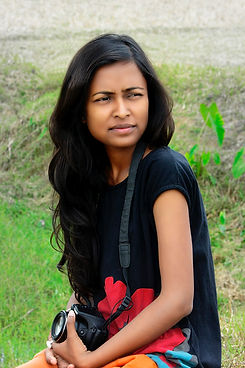
Prity Hait
I am an alumna of Cotton College, Assam, where I did my Masters in Zoology, with a specialisation in Ecology and Wildlife Biology.
I have been part of multiple wildlife research projects in Northeast India. I have participated in occupancy and social surveys in the Kaziranga–Karbi Anglong landscape. At present I work as a Research Affiliate, and I look into research and administrative needs of the organisation.
Over the years I have developed interest in understanding the dynamics of human–elephant interactions. My academic interest is in studying the behaviour of large mammals in heterogeneous landscapes of Northeast India.
Rokohebi Kuotsu
Born and brought up in a village landscape surrounded by fields and forests, I've always been connected with nature. But being from a community where hunting was a traditional practice, I grew up, confused to protect or hunt wildlife.
Eventually, after my bachelor's degree, I decided to work towards protection and conservation of wildlife and the environment.
Presently, I am working with communities and villages in Nagaland to spread awareness on conservation and help them to adopt environment-friendly means of livelihood.
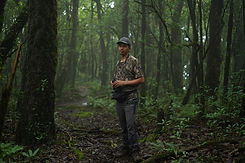

Sikha Hariharan
Sikha Hariharan is interested in understanding primate behaviour in its natural habitat, and in changing landscapes. She studies multiple aspects of lion-tailed macaque ecology in the rainforests of the Western Ghats. She enjoys spending hours following the macaques and observing these social animals. She is a Council of Scientific and Industrial Research Junior Research Fellow under the guidance of Dr. Divya Vasudev.
Sikha completed her Master’s in Zoology and started off following her passion by working with Centre for Wildlife Studies on their tiger monitoring and population estimation program. This shaped her understanding of advanced scientific methods and their importance in implementing conservation strategies. Apart from working on lion-tailed macaques, she has also assisted Dr. Varun Goswami in assessing elephant habitat and conservation status for a perspective plan formulated with the Arunachal Pradesh Forest Department.
When not looking at macaques, Sikha can be found working her fingers around crafts and hoarding books.
Nishanth S
Nishanth obtained his Master’s degree in Biotechnology from Bangalore University in 2012, and worked as a Junior Research Fellow at the Department of Molecular Reproduction, Development and Genetics at the Indian institute of Science. Long hours in the lab were spent pipetting and contemplating an alternative path in the field of ecology and wildlife conservation. Without much further ado he jumped ship and joined the Wildlife Conservation Society India Program. While there, between 2016 and 2019, he assisted on projects related to human–elephant interactions mostly in the Western Ghats landscape, under the guidance of Dr. Varun Goswami and Dr. Divya Vasudev.
Nishanth is interested in human–elephant interactions and landscape ecology. When not in pursuit of elephant sightings, which he is occasionally successful with, Nishanth can be found doodling in his sketchbook, doing graphic design or writing about topics that piques his interest.
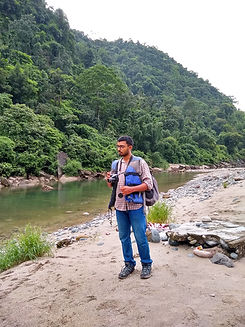
I am an engineer by training and have been working for the last one year on elephant research projects in Assam. For nearly 7 years, I worked with R&D in the automotive sector. During that time, a 9-month internship with TERI on urban ecology convinced me that I wanted to work with wildlife conservation.
Now, I am learning about different aspects of ecology & wildlife conservation on the job, and enjoy a nice mix of field and non-field work. I am interested in community ecology and species interactions, and believe in scientifically approaching conservation.
I love travelling to new natural landscapes, and faithfully practice Hatha Yoga.
Yogita Karpate
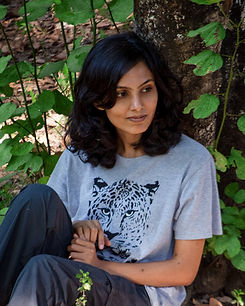

Aditya Banerjee
Aditya is from Kolkata, West Bengal. He did his B.Sc. in Zoology from Calcutta University, and completed his Masters’ in Wildlife Biology and Conservation from the National Centre for Biological Sciences, Bangalore in 2018. For his Master's dissertation, he assessed the effects of water hyacinth on smooth-coated otter habitat use in the Tungabhadra river in Karnataka. Following his MSc, he worked on a project with Ashoka Trust for Research in Ecology and the Environment, examining estuarine fish communities along a gradient of salinity in the Aghanashini and Sharavathi rivers in western Karnataka. He has also worked with the Wild Canids India Project, collecting secondary data on distribution of canid species in India and aiding in geospatial analysis for the same.
Aditya is currently working as a Research Affiliate for Conservation Initiatives, where he is undertaking a project investigating distribution and status of three species of otters in the Khasi Hills in Meghalaya.
Aditya is interested in freshwater ecology as well as population and behavioural ecology of mammals, and how these could be affected by increased human pressures and climate change. In his free time, he is an avid birdwatcher and likes to read books and write stories.

Tsuseki Yimchunger
I am from Fakim Village in Kiphire District, Nagaland, and have been working on wildlife conservation for more than 5 years. I have been working with local communities in my village and surrounding area. I formed the Bhutan Glory Eco Club with youth in my own village. I work as a Master Educator, teaching and training on the importance of biodiversity, and on photo- and video-documentation of Fakim Wildlife Sanctuary. I have received training on conservation from North East Network, and a one-year Fellowship from Green Hub on video documentation.
I understand that there needs to be a fine balance between the imperatives of wildlife conservation, and the needs of the people. I am determined to revive back wildlife and lost forestland in Nagaland, and improve our own water regime. Currently, I am working with my community on wildlife conservation, biodiversity documentation, creating awareness about the importance of conservation, and conservation-based livelihoods.
Binod Gogoi
Binod hails from a village bordering Kaziranga. His love for wildlife began from his days as a young boy seeing wildlife in and around Kaziranga.
He has been key to providing local support for our efforts in Kaziranga. Being one of the earliest residents of Kaziranga to become a safari driver in the National Park, he loves being behind the wheel! He believes that one day he will become a role model to the communities living in the Kaziranga landscape to conserve wildlife in the area.
Binod's involvement in various projects in Northeast India has helped and facilitated us to carry out our studies in the region. He has been involved in multiple surveys to study Asian elephant conservation in and around Kaziranga.
Apart from his interest in wildlife, he is also a very talented craftsman!
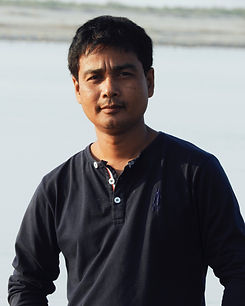
Pallab Gogoi
Pallab Gogoi has been working in our team since its start, in the Kaziranga–Karbi Anglong landscape. He participates in surveys and also helps in driving our team around different field sites, for data collection and conservation work. Pallab also spreads conservation awareness among communities in villages near Kaziranga.
Pallab is based in a village of the Kaziranga–Karbi Anglong landscape, and has been frequently visiting Kaziranga National Park since 1997. He is an active member of the “Kaziranga Development and Jeep safari Association”, and since 2006, has been taking tourists for safaris inside the park. This active engagement with the park has made him interested in conservation of wildlife, and of elephants in particular, in Protected Areas.
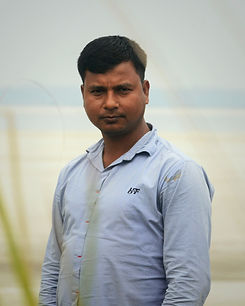

Aishanya Sarma
I am a Research Affiliate with Conservation Initiatives, involved in data collection and analysis. I have always had a lot of fondness for the natural outdoors. I had decided quite early in life that I would make a career out of doing field-based work on animals. Following a series of lucky interventions and having a completed a Master’s program in Wildlife Biology and Conservation, I find myself doing exactly that. I have a wide range of interests when it comes to ecology but I am more inclined towards animal behaviour, especially social behaviour and communication in group-living mammals such as bats and primates. I intend to work on approaches using animal physiology and cognition to address conservation issues in the future. I have previously worked on various projects related to large scale occupancy analysis of mammals in Northeast India.

Uthaiah
Born and brought up in Coorg, I was always fascinated by forests and its wildlife, which inspired me to work towards their conservation through scientific research. I completed my Master’s in Environmental Science from JSS University, Mysore. I worked for three years with the Wildlife Conservation Society India Program, where my work involved assessing human–elephant interactions and its mitigation around important Protected Areas in the Western Ghats.
My interest lies in the field and in understanding human–elephant interactions and how people respond to the elephant’s presence in human-dominated landscapes.
Anju Bawri
Anju is one of the first female conservation enthusiasts from the tea community of Kaziranga. She obtained her training in bird watching at workshops organised by the Kaziranga-based NGO Naturalist for Rehabilitation of Snakes and Birds and participated in a vocational training conducted by the Corbett Foundation. During this time, she grew quite interested of bird-watching and natural history. She worked in Kaziranga National Park as a tourist guide before joining a conservation research program in 2015.
Since then, Anju has been involved in multiple projects in the Kaziranga-Karbi Anglong landscape. She is particularly keen on interacting with tea communities to encourage positive human–elephant interactions.

Simon Sona
Born and brought up in a tea garden surrounded by forests, Simon was exposed to wildlife at a very young age, and eventually he developed an interest towards conservation.
Today, Simon plays an important role in building relationships with tea garden communities around Kaziranga to spread awareness on the protection of elephants and other wildlife. He has a long-term vision of ensuring that humans and wildlife live peacefully in this landscape that he calls his home. He is keen to take part in helping his community understand the importance of wildlife and wild places, and to conserve it.
He has been part of various research and conservation projects in the Kaziranga-Karbi Anglong landscape.
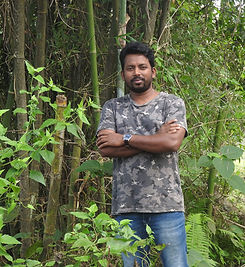

Jayanta Gogoi
Jayanta's interest in wildlife began when he started driving tourists into Kaziranga National Park as a livelihood source.
Since 2016, Jayanta has been contributing to research and conservation activities around his home in the Kaziranga landscape of Assam, as well as in the neighbouring state of Nagaland. He has actively participated in animal sign surveys and camera trapping efforts undertaken by the team, and enjoys learning about wildlife and landscapes in the process.
Living next to a National Park, Jayanta grew up closely observing people–animal interactions, and wants to work towards conserving wildlife, while ensuring people’s wellbeing.

Jagan R
Fascination with the pale blue-dot that is our Earth in the larger universe, is an epidemic not many can be immune to. Growing up in the vicinity of the amazing Western Ghats of India only sucked me in deeper. I decided that life away from wilderness isn't for me.
Having graduated as a Chemical Engineer, I joined a chemical firm as a process engineer, hoping I could earn a living that can satiate my desire for the woods. But this took me away from the very fabric of life that I hold so dear. By then, I could recognise the blatant threats to the glorious life-sustaining flora and fauna that provide natural capital for human existence.
Since then, I have dedicated my time and energy to studying and conserving natural landscapes. Currently I’m working in Northeast India where the local communities have a unique relationship with nature and the land.
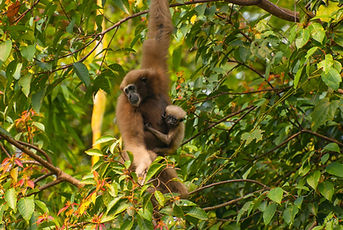
Anusha Ramji
Anusha oversees administration, finance and HR. She completed her Bachelor’s in Economics and Master’s in Econometrics, after which she has had multiple years of experience in project management and administration. She has always been inclined towards social work, and over the years, has interned and volunteered with projects to increase environmental awareness and responsibility in young minds (Class 1 – 4), develop material on appreciation of local history and environment in Chennai, and promote ecologically-sensitive waste management. She has had project managerial experience of nearly two decades across multiple organizations.
Anusha loves nature and the outdoors. She is happiest travelling and being exposed to new landscapes and customs.

